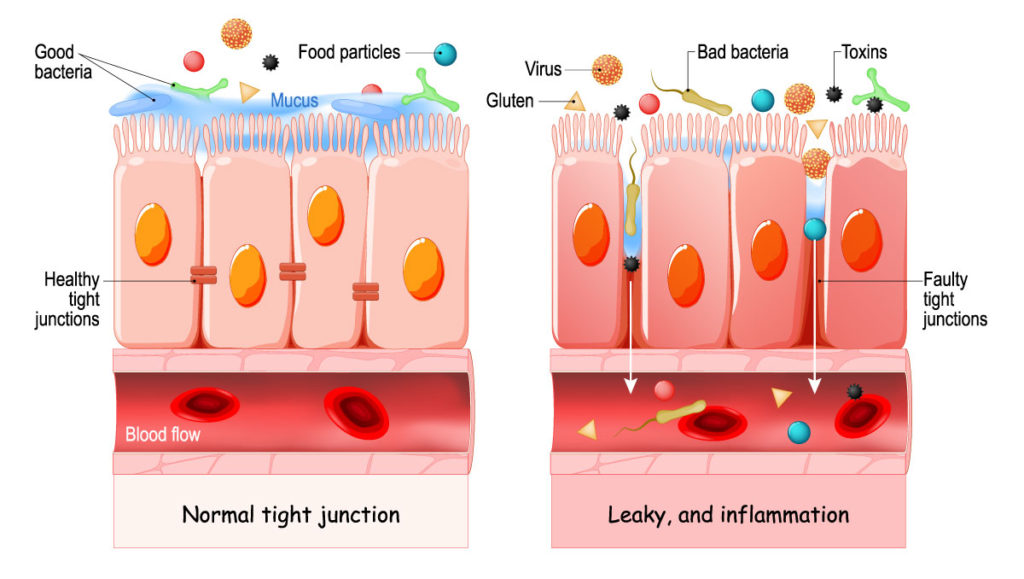How Leaky Gut Syndrome & Chronic Inflammation Impact Reproductive Health
When it comes to fertility issues and unexplained infertility, many couples focus on tracking ovulation, maintaining a healthy weight, and reducing stress levels. However, recent research has unveiled a surprising link between poor gut health and reproductive health, highlighting the crucial role of the gut-fertility connection in achieving a healthy pregnancy.
What is Leaky Gut Syndrome?
Leaky gut syndrome, also known as increased intestinal permeability, is a condition in which the lining of the digestive tract becomes damaged, allowing bacteria, toxins, and partially digested food particles to leak into the bloodstream(1). This can trigger an immune response and lead to chronic inflammation throughout the body(2), which can significantly impact reproductive organs and fertility.

Source: Dr. Todd Maderis
The Gut-Fertility Connection
So, how does leaky gut syndrome impact reproductive health?
When the gut barrier is compromised, it can set off a cascade of events that disrupt the delicate hormonal balance necessary for optimal fertility:
- Chronic Inflammation – Chronic inflammation caused by leaky gut syndrome can interfere with hormone production and balance, which are essential for regular ovulation and conception(3). This low-grade inflammation can affect the entire reproductive system, including the ovaries, uterus, and fallopian tubes.
- Nutrient Absorption – A damaged intestinal barrier can hinder the absorption of essential vitamins and minerals needed for fertility, such as folate, zinc, and omega-3 fatty acids(4). Nutrient deficiencies can lead to hormonal imbalances, irregular menstrual cycles, and implantation failure.
- Autoimmune Disorders – Leaky gut syndrome has been linked to autoimmune diseases(5) like Hashimoto’s thyroiditis and celiac disease, which can impair fertility by disrupting thyroid function and causing inflammation in the reproductive tract.
- Pregnancy Loss – A 2018 study published in the Journal of Translational Medicine(6) found that women with recurrent pregnancy loss had increased intestinal permeability compared to healthy controls. The researchers suggested that leaky gut syndrome may contribute to a novel pathogenic model of endometrial inflammation, leading to a higher risk of pregnancy loss. This finding highlights the potential role of gut health in maintaining a healthy pregnancy and reducing the risk of miscarriage.
- Estrogen Dominance – An imbalanced microbiome can lead to estrogen dominance, a condition characterized by high levels of estrogen relative to progesterone. This can contribute to endometrial hyperplasia, polycystic ovary syndrome (PCOS), and other hormonal imbalances that negatively impact fertility(7).
- Gut-Brain Axis – The gut, often referred to as the “second brain,” is closely connected to the body’s stress response through the gut-brain axis. Chronic stress can exacerbate leaky gut syndrome, creating a vicious cycle that further impacts fertility(8).
Healing Your Gut for Improved Reproductive Health
The good news is that by focusing on gut health, you can not only improve your overall health, but also boost your chances of conception.
Here are some steps you can take to heal your gut and support fertility:
- Adopt an anti-inflammatory, balanced diet – Focus on whole, nutrient-dense foods like vegetables, fruits, lean proteins, and healthy fats, which studies have shown help modulate the gut microbiome(9). Avoid processed foods, refined sugars, and common gut irritants like gluten and dairy.
- Prioritize gut-healing nutrients – Incorporate foods rich in gut-supportive nutrients(10) like bone broth, fermented vegetables, and omega-3 fatty acids. Consider supplementing with collagen, glutamine, and probiotics to further support gut repair.
- Manage stress – Engage in stress-reducing activities like meditation, yoga, or deep breathing exercises to help regulate the gut-brain axis and reduce inflammation.
- Address underlying infections – Work with a functional fertility professional to identify and treat any underlying gut infections, such as small intestinal bacterial overgrowth (SIBO) or candida overgrowth.
- Minimize toxic exposure to environmental factors – Reduce your exposure to environmental toxins by choosing organic produce, filtering your water, and using natural cleaning and personal care products.
Conclusion
By prioritizing gut health, you can create a more hospitable environment for conception and support your reproductive health. If you suspect you may have leaky gut syndrome or are struggling with fertility issues, consult with a functional medicine practitioner who can help you develop a personalized plan to heal your gut and optimize your fertility.
Remember, the fertility journey often involves a holistic approach. By nurturing your gut health, you’re taking a significant step towards supporting your reproductive system and creating a strong foundation for a healthy pregnancy.








